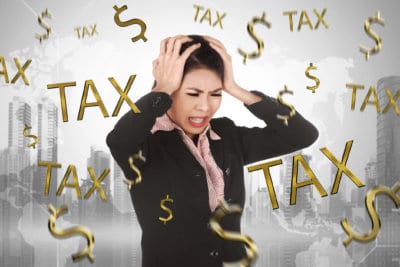Willfully failing to file your tax returns is a crime, no matter what business you own. You might have noticed the Gavrilov & Co Blog has been featuring tax tips in several niche businesses as we celebrate the tax season. We did this for two reasons:
1. We know you don’t want to read the same old generalized tax information every accountant in the US is posting.
2. We want to honor the niche industries, many of whom are our clients.
All this being said, we must emphasize that willfully failing to file your tax returns in any niche is a crime.
The Mathew Price Story: Willfully Failing to File

It’s just some niches are watched more closely than others. In 2019, the niche that has been gathering a lot of attention lately at local, state and federal levels, is the cannabis industry. So Matthew Price of Oregon “should have listened to his accountants.”
Mathew Price owned a medical marijuana dispensary in Oregon. Recently, a federal court sentenced him to seven months in prison. He now holds the dubious honor of being the first owner of a medical marijuana dispensary to be sentenced for failure to file his taxes.
Price, co-owned the cleverly named “Cannabliss” dispensaries. And he plead “guilty to willfully failing to file income tax returns in connection with his cannabis stores. Likewise, he did not file individual tax returns from 2011 to 2014 for income received from the dispensaries’ operations. And thus he was deeply mired in obvious guilt.
But the worst part of the story, the tragic twist, is that a number of different CPAs tried to save him during those years. They advised him. They warned him. And there is a lesson there, especially given the fact that New York is so close to having these types of stores.
Defining Willfully Failing to File Your Taxes
You may not realize the meaning of this phrase of willfully failing to file your taxes. Therefore, we have a few legal points that will help you enjoy today’s story more. Section 7203 of the Internal Revenue Code makes it a Federal crime to willfully fail to:
(1) file a tax return.
(2) supply information.
(3) or to actually pay a tax.
“The Department of Justice’s position is that this misdemeanor offense of willfully failing to file a tax return, pay tax, keep records or supply information should only be charged when a defendant fails to comply with an affirmative requirement of the Internal Revenue Code,” They further define that he must not have committed any “act or omission as part of an attempt to evade taxes or obstruct the IRS.”
However, the DOJ will charge you with felonies if you fail to file tax returns or pay a tax as well as evade or obstruct will. Those are felonies under Section 7201 or 7212. Yes, that word is “felonies,” and it generally means prison.
The Facts Behind Failure to File Taxes
Rachel Gillette is a partner and chair of a different cannabis company. Greenspoon Marder’s cannabis practice has stern advice for anyone thinking of going into this burgeoning business. She stated, “As with any business, marijuana business owners must operate in strict compliance with the local, state and federal tax laws…”
Gavrilov & Co wants you to know that for cannabis businesses, tax compliance is a vital part of operating in a state-legal marketplace.
1. Your Basic Tax Issues: Understand the IRC Section 280 E, which we discussed in a previous blog.
2. The Legal Issue: Know how 280 E affects your company as well as the owners of flow-through marijuana entities.
3. A License Issue: Gillette said, “A tax issue can cause big problems for marijuana businesses and business owners.” And she continued, “as most states require license holders to be ‘tax-compliant’ in order to maintain the license…”
In Addition to not Failing to File, Code Section 280E Brings you Some Notable Rules

Be aware that Code Section 280E forbids you as a marijuana dispensary, to enjoy any of the business deductions ordinary businesses appreciate. As Gavrilov has posted previously, this is because marijuana is still federally an illegal substance. So you can NOT deduct businesses expenses from gross income. Here is why. It is because marijuana is associated “with the trafficking of Schedule I or Schedule II substances as defined by the Controlled Substances Act.” And this is true no matter what any particular state says or rules.
Let’s Look it Up: Filing Business Expenses? Nope!
Specifically, the statute states: “No deduction or credit shall be allowed for any amount paid or incurred during the taxable year in carrying on any trade or business if such trade or business (or the activities which comprise such trade or business) consists of trafficking in controlled substances.” This relates to the meaning of “Schedule I and II of the Controlled Substances Act.)”
And it continues to point out such selling of “Schedule I and II of the Controlled Substances are prohibited by federal law and/or the laws of some states.” For more about 280 E, take a look at this excellent online resource about Internal Revenue Code Section 280E.”
Now, CPAs and the Tax Squad at Gavrilov & Co think that is legally pretty clear. However, we wanted to print it out just to make sure you were well informed.
In a recent article from Accounting Today, it is astutely explained. “Cannabis retailers, therefore, are denied the deductions or credits normally available to businesses, since cannabis falls under the definition of a Schedule I substance…” Therefore, make no mistake, you must pay tax on your gross income.
A Few More Notes about the Cannabis Industry and the IRS
As we said, some niches of business are watched by the IRS more than others. As you might guess from the tainted past of its product, the cannabis sector faces intense scrutiny from the IRS.
Fact 1: “Marijuana businesses are audited at greater rates than other businesses, according to Gillette.
Fact 2: The IRS aggressively applies the 1982 Tax Code provision Section 280E.
And finally, Fact 3: Many business owners and even some tax accountants do not know how Sec. 280E applies to the niche business.
Fact 4. Because of Fact 3, above, business owners can incur tax deficiencies totally innocently. Without a good CPA, this can happen in spite of their best efforts to do the right thing.
More Irony in the Price Story

No one is above the law when the IRS catches them failing to file their taxes. Bloomberg News reported that Mathew Price “was a member of the Oregon Liquor Control Commission’s Recreational Marijuana Technical Advisory Retail Subcommittee in 2015…” Likewise, he advised the OLCC in their adoption of laws for regulating the new industry.
These honors did him no good against his willfully avoiding filing his taxes.
Gillette stated, “The prosecution serves as a reminder for people in the marijuana industry.” And “they will be subject to heightened scrutiny by tax and regulatory authorities…” She added, “because of this they really need to be in strict compliance with local and federal tax filings and payments.”
A New Twist: More Here than Meets the Eye
Yes on the basic level we might be tempted to think the IRS is singling out this industry and persecuting it for a shady past.
Let Gavrilov & Co enlighten you. The risk of audit is not because of the nature of the industry—at least not blatantly. The audit is a higher risk because of an almost legendary lack of banking. This is especially true in Oregon. And we hope there will be less of a problem in New York. You see, there are quite a few stores and not quite enough banks in Oregon. At least that is the rumor. And it sounds like a licensing problem to us.
Under-banked Businesses Have Problems
As we stated in the previous blog, there are few businesses as cash-intensive as cannabis. We have seen many of them who simply do not keep bank accounts. And Gillette stated, “Banks are not keen on offering accounts to businesses that are not in compliance with federal law.” This is true even if the businesses are legal under local jurisdiction.
“So cannabis businesses are under-banked,” she said. “In Colorado, only a handful will allow a marijuana business to open an account. There’s not nearly enough for all the licensed businesses to have an account.” Therefore many operate solely in cash. “When that happens in any business, the IRS is likely to apply special attention and additional audits.” We have blogged a bit about this previously.
The Cannabis Industry’s First Line of Defense: Do Not Make an Accidental Mistake with Your Tax Filing

The first line of defense for these more closely scrutinized businesses should be to reduce the risk of legal and tax non-compliance liability. Gavrilov & Co emphasizes that this means in both corporate and personal tax life.
- First make sure that the legal, tax and accounting rules for cannabis compliance in each state are well understood by your tax staff and their advisers.
- Such an understanding will then enable your tax staff to set up the procedures needed to get and stay compliant. And the sooner the better. Of course, it goes without saying that choosing a tax accounting firm who has studied the cannabis niche specifically, and knows the law is your best move here.
- Gavrilov & Co reminds you that best accounting practices reduce the risk of noncompliance. Additionally, they will also show “good faith” to state attorneys general, the IRS, and the DOJ. And you can bet all of them will be increasingly “on notice” the minute you register your cannabis business in your state.
At Gavrilov & Co, we pay special attention to the laws regarding all niche businesses, large and small. The tax squad is ready to help you avoid the tax crime of Willfully Failing to File. The moral of the Mathew Price Story and his ill-fated “Cannabis” stores is that Once your CPA has given you tax crime advice, you must do your part. Listen.

